

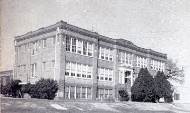
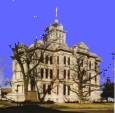

Milam County Historical Commission
Milam County, Texas
Milam County, Texas

All credit for this article goes to
Mike Brown
and the
Rockdale Reporter
Mike Brown
and the
Rockdale Reporter
Mr. Smith Goes to Washington
97-year-old WWII vet on ‘honor flight’ trip
By Mike Brown - Reporter Editor
Rockdale Reporter - October 1, 2015
When former Rockdale resident Doug Smith hit the beach at Leyte in the Philippines during World War II, he didn’t think he’d be laughing But there was a moment of levity before the serious business started.
“All during our training our commanding officer was Col. Taylor, a tall, skinny guy with no chin,” Smith recalled. “Just like a very famous comics character called Andy Gump in the 1920s.”
“Our battle cry was ‘Over The Hump With Andy Gump,” Smith said.
“When we went over the side of our ship, I happened to get into the same landing barge with him.”
“As we pushed away from the ship, Col. Taylor stood up in the front and hollered ‘Over The Hump With Andy Gump’!”
Next week, Smith — who turns 97 on Monday — will be part of Honor Flight Austin, a select group of veterans who will travel to Washington D.C. for a tour of military memorials and Arlington National Cemetery.
World War II veterans are given priority on Honor Flights.
CRYPTOGRAPHER — The native of Cedar Creek, near Bastrop, had been through the Great Depression and was working for Douglas Aircraft for the first part of World War II.
He had set up a plant to make control panels for bombers, so each time his draft number came up, he’d get a deferment.
“But then I got an other 1A (draft notice) and I said ‘to heck with it,’ got on the train, came home to Texas and reported to the draft board,” Smith said.
“They asked me what I wanted to do,” he recalled. “My brother, Dan, was in the Navy so that’s what I chose but the Air Force guys saw my record (working on aircraft) and they said ‘oh no, we want him’.”
Smith was sent to Sheppard Field in Wichita Falls where his “lazy eye” (amblyopia) disqualified him from being a pilot.
“One day one of the officers came in and said ‘how would you like to be a cryptographer?’ Smith recalled. “I said ‘I guess so whatever that is’.”
LE SHIMA — It’s coding and decoding secret messages. After training in Illinois, Smith was sent back to San Antonio to join his outfit, and ended up aboard the troop ship David C Shank headed for New Guinea.
His outfit was called to The Philippines. After going “over the hump with Gump” they set up “literally in a bunch of coconut trees,” where he started his decoding work, and went on to Clark Field in the capital city of Manila.
“Then we got called up to the northern end of the island of Luzon, at Laoag,” Smith said. “We sat up an emergency air base there.”
At that time the Air Force was bombing the island of Formosa (now called Taiwan). “They’d get shot out of the air and we’d have someone pick them up out of the water and bring them to us,” he said. “Then we got loaded up on a small landing barge and went to Le Shima, a little island just off Okinawa.
It’s where the famous reporter Ernie Pyle was killed,” Smith said A-BOMB—He was in Le Shima for the rest of the war.
There are a lot of philosophical discussions about dropping the atom bomb on Japan but to Smith the discussions are more personal.
“I was one of the boys who would have been sent over in the invasion of Japan,” he said. “We were getting ready to do it, but thank goodness we didn’t have to.”
Ironically, years later while working for Alcoa in Rockdale, Smith would befriend Joe Stiborik who was the radar operator on the Enola Gay, the airplane which dropped the first A-bomb on Hiroshima Aug. 6, 1945.
Prior to the surrender in September, 1945, the Japanese delegation stopped in Le Shima to change planes. Smith was there.
“They got on American planes at Le Shima, then went on to Manila to meet with General MacArthur, then went on to Tokyo Bay for the surrender,” Smith said. TYPHOON — But that was far from the end of Smith’s adventures in the Far East.
On Oct. 9, 1945, Typhoon Louise slammed into the Okinawa area. (Northwest Pacific hurricanes are called “typhoons.)
“They had sent us to Buckner Bay on Okinawa,” Smith said. “We were taking on supplies when we heard this storm was coming.” Smith was part of a group that was ordered out to sea to ride out the storm.
“We were in a “landing board” (a flat-bottomed troop transport craft) and we rode out that storm for five days,” he said.
“We’d go up and down and that thing would hit bottom and you knew it. Somehow we got over that.
It was my worst experience of the war,” Smith said. Later referred to as a “super typhoon,” Louise took the lives of 83 American military personnel and grounded, sunk or damaged 265 ships.
Today’s category classification of hurricanes was not yet in use. Louise was ranked a “Force 17,” the highest number used.
Force 12 denoted hurricane strength.
“I know when we came back into port, everything was all torn up, wreckage everywhere,” Smith said.
OCCUPATION — Smith was briefly on Japan as part of the American occupation force, first on the northern island of Hokkaido.
“Then I got my orders to come back,” he recalled. “I rode the train into Tokyo and waited until I could get a ship back to the U. S.
“And then when I got a ship back it was one of those Kaiser Ships. (Mass produced by Kaiser Shipyards, not built for speed or comfort.)
“Those things had round bottoms and, man, they rolled and rolled and rolled!” he said.
POST WAR — Then it was back to the Smith home at Cedar Creek, where his mother, the remarkable Sophie Smith, was running the family’s general store.
“My father had died in 1936,” he said. “He got pneumonia and when you got pneumonia back then you died.”
“My mother was quite a story in herself. She was sick with a goiter — a swelling in the neck from a thyroid problem — and the way she worked all her life was really heroic,” Smith said.
“We didn’t have plumbing for many years and our water was from cisterns unless they went dry, which they did during the droughts,” he said.
“When they went dry we’d have to haul water,” he said. “And there weren’t any water wells in Cedar Creek. You had to go three or four miles and we’d take it home in barrels.”
DEPRESSION — Smith remembers life in his house during the Depression. “My mother took in boarders. There was a little oil field in the area and the workers got paid $2 a day,” he said. “My mother would charge them $1 a day and for that they got three meals and a place sleep.”
Does that mean the workers then existed on $1 a day for all their other needs?
“Yes sir,” Smith said.
“I slept outside on a sleeping porch, all weather, hot or cold,” he recalled.
“So did my brother, Dan.”
“But you know, I loved it,” Smith said, “I had a curtain that rolled down over me if it rained. It would be cold and I’d close up the store and everyone else had gone to bed. I’d get into bed and my grandmother would have put some hot rocks in there to keep me warm.”
“That was some good sleeping,” he smiled.
ALCOAN - After his discharge, Smith decided he didn’t want to go back to California.
He worked in the oilfields around Lockhart and then the Caldwell County Sheriff asked him to be a deputy.
But then he read in a newspaper that Alcoa was building a new plant in Rockdale.
Before the war Smith had studied at Durham’s Business School and Alcoa hired him as an accountant.
He worked in Rockdale, Pittsburgh, Maryville (Tennessee), Evansville (Indiana) then back to Rockdale.
Smith had one of the first computers at Rockdale Works.
“It was the size of a bedroom,” he laughed. “Now you’ve got everything I had and more in a phone you can hold in your hand.”
HONORS — Smith now lives in Round Rock’s sprawling The Court assisted living facility, is energetic and lively and gets around it nicely.
His wife, Florence, passed away in July. He’s excited about the Honor Flight.
Smith and a select group of veterans will depart Austin Oct. 9 and be treated to dinner at the Alexandria (Virginia) Hilton.
The next day they will tour the World War II Memorial, where there will be a ceremony.
They will also see the Vietnam, Lincoln, Iwo Jima (Marine), Air Force, Veterans Disabled for Life and Navy memorials and Arlington National Cemetery before returning to Austin.
Notice that Honor Flight’s date, Oct. 9. It’s significant.
Exactly 70 years previous, Doug Smith and a lot of other brave Americans were on another “ride,” pitching up and down off the Philippines surviving Typhoon Louise.
97-year-old WWII vet on ‘honor flight’ trip
By Mike Brown - Reporter Editor
Rockdale Reporter - October 1, 2015
When former Rockdale resident Doug Smith hit the beach at Leyte in the Philippines during World War II, he didn’t think he’d be laughing But there was a moment of levity before the serious business started.
“All during our training our commanding officer was Col. Taylor, a tall, skinny guy with no chin,” Smith recalled. “Just like a very famous comics character called Andy Gump in the 1920s.”
“Our battle cry was ‘Over The Hump With Andy Gump,” Smith said.
“When we went over the side of our ship, I happened to get into the same landing barge with him.”
“As we pushed away from the ship, Col. Taylor stood up in the front and hollered ‘Over The Hump With Andy Gump’!”
Next week, Smith — who turns 97 on Monday — will be part of Honor Flight Austin, a select group of veterans who will travel to Washington D.C. for a tour of military memorials and Arlington National Cemetery.
World War II veterans are given priority on Honor Flights.
CRYPTOGRAPHER — The native of Cedar Creek, near Bastrop, had been through the Great Depression and was working for Douglas Aircraft for the first part of World War II.
He had set up a plant to make control panels for bombers, so each time his draft number came up, he’d get a deferment.
“But then I got an other 1A (draft notice) and I said ‘to heck with it,’ got on the train, came home to Texas and reported to the draft board,” Smith said.
“They asked me what I wanted to do,” he recalled. “My brother, Dan, was in the Navy so that’s what I chose but the Air Force guys saw my record (working on aircraft) and they said ‘oh no, we want him’.”
Smith was sent to Sheppard Field in Wichita Falls where his “lazy eye” (amblyopia) disqualified him from being a pilot.
“One day one of the officers came in and said ‘how would you like to be a cryptographer?’ Smith recalled. “I said ‘I guess so whatever that is’.”
LE SHIMA — It’s coding and decoding secret messages. After training in Illinois, Smith was sent back to San Antonio to join his outfit, and ended up aboard the troop ship David C Shank headed for New Guinea.
His outfit was called to The Philippines. After going “over the hump with Gump” they set up “literally in a bunch of coconut trees,” where he started his decoding work, and went on to Clark Field in the capital city of Manila.
“Then we got called up to the northern end of the island of Luzon, at Laoag,” Smith said. “We sat up an emergency air base there.”
At that time the Air Force was bombing the island of Formosa (now called Taiwan). “They’d get shot out of the air and we’d have someone pick them up out of the water and bring them to us,” he said. “Then we got loaded up on a small landing barge and went to Le Shima, a little island just off Okinawa.
It’s where the famous reporter Ernie Pyle was killed,” Smith said A-BOMB—He was in Le Shima for the rest of the war.
There are a lot of philosophical discussions about dropping the atom bomb on Japan but to Smith the discussions are more personal.
“I was one of the boys who would have been sent over in the invasion of Japan,” he said. “We were getting ready to do it, but thank goodness we didn’t have to.”
Ironically, years later while working for Alcoa in Rockdale, Smith would befriend Joe Stiborik who was the radar operator on the Enola Gay, the airplane which dropped the first A-bomb on Hiroshima Aug. 6, 1945.
Prior to the surrender in September, 1945, the Japanese delegation stopped in Le Shima to change planes. Smith was there.
“They got on American planes at Le Shima, then went on to Manila to meet with General MacArthur, then went on to Tokyo Bay for the surrender,” Smith said. TYPHOON — But that was far from the end of Smith’s adventures in the Far East.
On Oct. 9, 1945, Typhoon Louise slammed into the Okinawa area. (Northwest Pacific hurricanes are called “typhoons.)
“They had sent us to Buckner Bay on Okinawa,” Smith said. “We were taking on supplies when we heard this storm was coming.” Smith was part of a group that was ordered out to sea to ride out the storm.
“We were in a “landing board” (a flat-bottomed troop transport craft) and we rode out that storm for five days,” he said.
“We’d go up and down and that thing would hit bottom and you knew it. Somehow we got over that.
It was my worst experience of the war,” Smith said. Later referred to as a “super typhoon,” Louise took the lives of 83 American military personnel and grounded, sunk or damaged 265 ships.
Today’s category classification of hurricanes was not yet in use. Louise was ranked a “Force 17,” the highest number used.
Force 12 denoted hurricane strength.
“I know when we came back into port, everything was all torn up, wreckage everywhere,” Smith said.
OCCUPATION — Smith was briefly on Japan as part of the American occupation force, first on the northern island of Hokkaido.
“Then I got my orders to come back,” he recalled. “I rode the train into Tokyo and waited until I could get a ship back to the U. S.
“And then when I got a ship back it was one of those Kaiser Ships. (Mass produced by Kaiser Shipyards, not built for speed or comfort.)
“Those things had round bottoms and, man, they rolled and rolled and rolled!” he said.
POST WAR — Then it was back to the Smith home at Cedar Creek, where his mother, the remarkable Sophie Smith, was running the family’s general store.
“My father had died in 1936,” he said. “He got pneumonia and when you got pneumonia back then you died.”
“My mother was quite a story in herself. She was sick with a goiter — a swelling in the neck from a thyroid problem — and the way she worked all her life was really heroic,” Smith said.
“We didn’t have plumbing for many years and our water was from cisterns unless they went dry, which they did during the droughts,” he said.
“When they went dry we’d have to haul water,” he said. “And there weren’t any water wells in Cedar Creek. You had to go three or four miles and we’d take it home in barrels.”
DEPRESSION — Smith remembers life in his house during the Depression. “My mother took in boarders. There was a little oil field in the area and the workers got paid $2 a day,” he said. “My mother would charge them $1 a day and for that they got three meals and a place sleep.”
Does that mean the workers then existed on $1 a day for all their other needs?
“Yes sir,” Smith said.
“I slept outside on a sleeping porch, all weather, hot or cold,” he recalled.
“So did my brother, Dan.”
“But you know, I loved it,” Smith said, “I had a curtain that rolled down over me if it rained. It would be cold and I’d close up the store and everyone else had gone to bed. I’d get into bed and my grandmother would have put some hot rocks in there to keep me warm.”
“That was some good sleeping,” he smiled.
ALCOAN - After his discharge, Smith decided he didn’t want to go back to California.
He worked in the oilfields around Lockhart and then the Caldwell County Sheriff asked him to be a deputy.
But then he read in a newspaper that Alcoa was building a new plant in Rockdale.
Before the war Smith had studied at Durham’s Business School and Alcoa hired him as an accountant.
He worked in Rockdale, Pittsburgh, Maryville (Tennessee), Evansville (Indiana) then back to Rockdale.
Smith had one of the first computers at Rockdale Works.
“It was the size of a bedroom,” he laughed. “Now you’ve got everything I had and more in a phone you can hold in your hand.”
HONORS — Smith now lives in Round Rock’s sprawling The Court assisted living facility, is energetic and lively and gets around it nicely.
His wife, Florence, passed away in July. He’s excited about the Honor Flight.
Smith and a select group of veterans will depart Austin Oct. 9 and be treated to dinner at the Alexandria (Virginia) Hilton.
The next day they will tour the World War II Memorial, where there will be a ceremony.
They will also see the Vietnam, Lincoln, Iwo Jima (Marine), Air Force, Veterans Disabled for Life and Navy memorials and Arlington National Cemetery before returning to Austin.
Notice that Honor Flight’s date, Oct. 9. It’s significant.
Exactly 70 years previous, Doug Smith and a lot of other brave Americans were on another “ride,” pitching up and down off the Philippines surviving Typhoon Louise.
Japanese officials changed planes at Le Shima en route to sign surrender documents in Tokyo Bay in 1945.
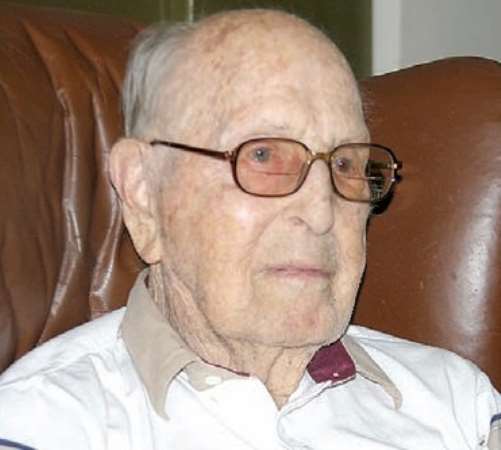
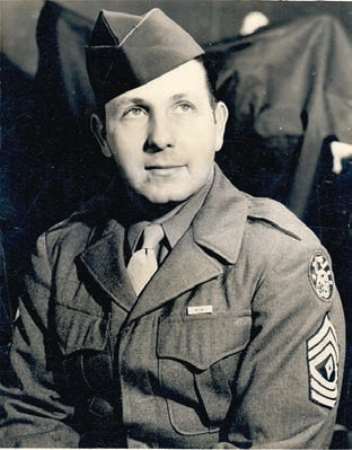
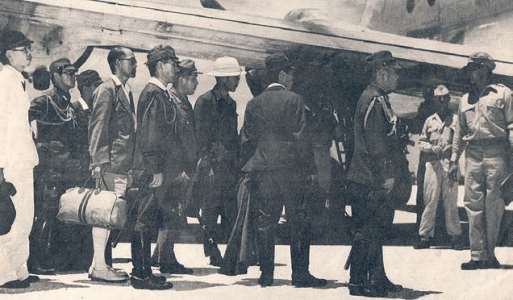

He’ll be 97 on Monday. In World War II, Doug Smith became a sergeant in the fledgling
U. S. Air Force.
U. S. Air Force.
Smith ended up going ‘over the hump with Andy Gump’ when his landing barge hit The Philippines.
Smith shares some of his memories from a full and busy life. His beloved wife, Florence passed away in July.
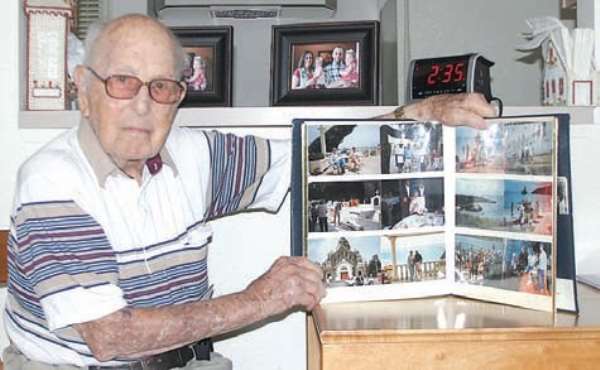
.